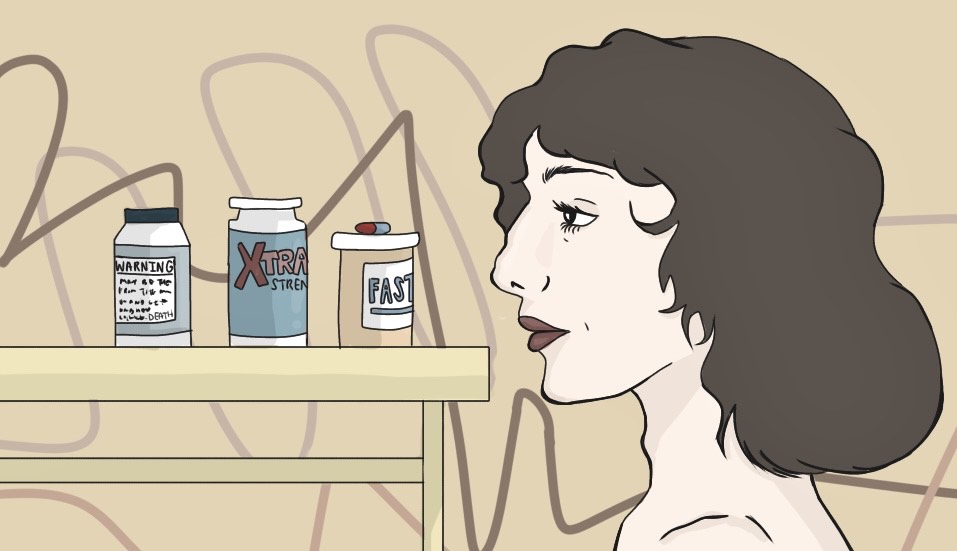By: Julia Torres
Advil, Benadryl, Claritin, DayQuil, Execdrin. Painkillers line the insides of drawers and cabinets in nearly every home; it is an inescapable aspect of living. And we, as consumers, are addicted to the instant pleasure that they provide.
Every dull ache and sharp pain can be easily settled with the aid of a few colorful pills and a glass of water. Within 30 minutes, normalcy resumes. Pleasure on demand. Minor inconveniences are no longer bothersome, they are easily curable with at-home remedies.
These small bottles that we carry around with us contain labels with lengthy lists of chemical properties that are unfamiliar to most. Also listed are possible side effects that your body may inadvertently have to the medication. Many times, this includes grave outcomes such as death.
Potential severe reactions that may lead to fatalities do not cross our minds as we take our usual medication. As consumers, the desire to assuage our discomfort overrides the potential of irreparable harm. Who are we to think we know more than our doctors? Who would dare to make a mockery of the prestigious medical field?
Our consistent decision to take calculated risks with our medication is far more nuanced than simply defending the honor of the healthcare field. It is also more pervasive than crafty pharmaceutical marketing and sales tactics, which lead us to create subliminal positive connotations with medication.
It is true that we live in a sue-happy country, where companies must legally disclose medical side effects no matter how negligent the data may be. Yet, the underlying sentiment is that as a younger generation, we have been raised to reject the possibilities that extreme situations are a possibility for us as individuals. We are desensitized to worst case scenarios, which will always surely be inapplicable. We are neither the lower nor the upper 1%. We all get participation awards, never a podium trophy or the shame of coming in last place.
In terms of our health: we are not part of the marginal data that will have a volatile reaction to our daily intake of medication. This thought does not cross our mind, not even once.
Let me offer an interpretation of this phenomenon: Gen Z’s mindless consumption of medication in the face of any nuisance is representative of our dismally low threshold for discomfort and suffering.
When any pain arises, no matter how minor it may be, we will take any and all steps necessary to avoid the pain of suffering. We would rather immediately take a painkiller than face the inconvenience of sitting in our discomfort and learning how to deal with it. Unfortunately, this mentality transfers to how we take on challenges in our daily lives. We would much rather cut corners than undergo the pruning process of achievement and growth. We will do anything to shield ourselves from the painful realities of life.
We desire short term alleviation – the shallow patching up of symptoms, while the sickness inside of us evolves and spreads.
Gen Z does not know how to deal with pain. Because we never learned how to win, we never learned how to lose. Anything that cannot be solved with an Advil immutably discourages us. We have been indoctrinated by the entitlement of pleasure.
However, regularly taking medication comes with high costs. Our bodies create tolerance to our remedies, forcing us to take higher doses over time. A reliance on painkillers to solve our issues comes with a greater dependence on temporary solutions, as we treat the symptoms and not the source of the issue.
Our discomfort with discomfort is one that is a disservice to us. Often, we refuse to go through the character arc associated with hardship since an easy way out is readily available. Our generation is characterized by avoidance.
It is easy to associate pain, both literal and figurative, with failure. Due to the emphasis placed on aesthetics and performance, suffering has become synonymous with what we have done incorrectly. From a young age, we have been told that we are the bearers of our own destinies; all achievements are within our reach if we invest enough effort.
However encouraging this advice may be at face value, it often has the opposite effect when put into practice. This mindset that has been drilled into our malleable, young brains has told us that every failure, therefore, is made by our own hand. Both our highs and lows point back to characterizations of ourselves, our efforts and abilities.
It should come as no surprise, then, that we will do anything to run away from this feeling. Our “medications” take many shapes: lying, endless justifications, a lack of self-accountability, ghosting, and indifference among others. We will point to any scapegoats rather than sit with ourselves and take full ownership of our actions. Instead of changing our work ethic when producing inadequate work, we would much rather claim that we had an inexplicable illness or a family emergency.
When given the opportunity to evade a difficult situation, we run with it.
However, this begs further inquiry. This mindset may very well be working for you as an undergraduate student, but how far will it truly take you?
We are being raised as a generation that refuses to address the root of the issue. Critical thinking, emotional intelligence, logical reasoning, and compassion are no longer at the top of our lists of priorities. I will be the first to claim that this generational disease has a poor prognosis.
So, continue taking your prescribed medication with delusional bliss. Chances are, it will never harm you.
But, at the end of the day, perhaps it will.


Leave a comment